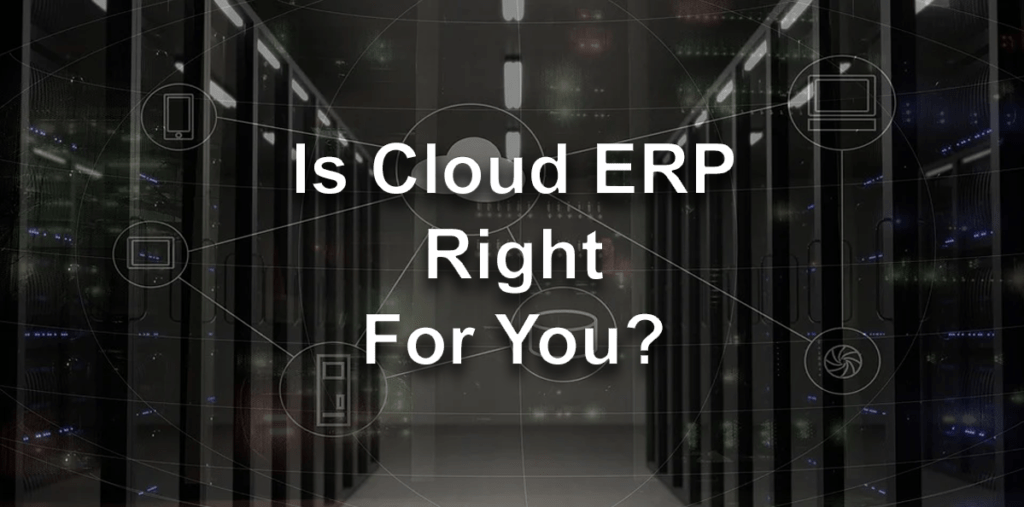Is Cloud ERP Right for You?
The world of cloud ERP (Enterprise Resource Planning) has been evolving since 1996. Today, many ERP providers offer various types of cloud ERP. And with so many options, you may wonder if the cloud ERP is right for you. Furthermore, how to choose between cloud and on-premise ERP solutions.
In my article on “Cloud ERP or On-Premise ERP – What you Need to Know,” I explained the differences between cloud and on-premise ERP (Enterprise Resource Planning). In the same article, I illustrated the crucial differences between cloud ERP and other cloud software.
This article will explain if cloud ERP is right for you.
The Cost Components
How do you decide on the options and see if cloud ERP is right for you? Firstly, you can start by comparing the various costs of implementing an ERP solution. Some fees are one-time costs, and some are recurring.
| Types of Cost | On-Premise ERP | Cloud ERP |
| One-Time Costs | ||
| Implementation Services | X | X |
| Server Hardware the Network Infrastructure | X | |
| Software License | X | |
| Recurring Costs | ||
| Software Annual Maintenace (For on-premise) | X | |
| Software Subscription | X | |
| Support Services | X | X |
| IT Support (Internal or external resources, to maintain the server) | X | |
| Replacement or Upgrading of Server (Usually every 4 to 7 years) | X | |
| Subscription to infrastructure services to allow access of ERP from outside of the office) | X |
The above costing is a simplified representation of the costs of Cloud ERP and On-Premise ERP projects. We assume that the company cannot access their server from outside their office and want to acquire this ability. We also assume that the company already has an office network and Internet access.
Simplicity
Just by looking at the cost components of both options, you will immediately notice the simplicity of the cloud ERP as compared to the on-premise ERP.
So, the one distinct advantage of cloud ERPs is their simplicity. Companies need to do a proper implementation, subscribe to the ERP, and start to use it. Cloud ERP is right for you if you don’t want to worry about the server and IT infrastructure.
Flexibility
The other advantage of cloud ERP is its flexibility to scale up and down. You can easily add users, change user type, and even reduce the number of users. For the on-premise perpetual license model of ERP, such flexibility to scale down is often not available.
So, cloud ERP is right for you if the flexibility to scale up and down the user license is an added advantage to your business.
Good Option for Smaller Companies
Most cloud ERPs are priced by the number of users. So, it is usually very affordable for companies with a smaller number of users.
However, for companies with a large number of users, it may be costly.
So, do your calculation and understand the breakeven points between the cloud and on-premise options to determine if cloud ERP is right for you.
Company Policy
Companies will need to consider their company policies and, sometimes, the policy of their customers. Some companies forbid hosting of information outside of their company premises. In these situations, you should rule out the cloud option.
Customization
It is essential to minimize customizations if you decide to subscribe to cloud ERP. Cloud ERP vendor will periodically enhance their system, and sometimes, these enhancements may cause conflict with customizations done in your ERP.
So, for companies who foresee heavy customization, Cloud ERP may not be right for you.
Shared Resources
They are companies which handle a high volume of transaction and processing speed is critical. Cloud ERP users shared the same hosting resources with other companies users. Any heavy transaction users in this user pool will affect the user experience of all the users.
If your company handle a high volume of transaction and processing speed is critical, cloud ERP may not be right for you. Alternatives such as private cloud hosting or on-premise server may be better options.
Buyer Beware – Unpredictable Future
So, what are the risks of subscribing to a cloud ERP solution?
Cloud services are like a rental:
- The subscription price may increase in the future.
- It may become more expensive when you use more advanced modules in the future.
- The vendor may go out of business.
- And it may not be easy to exit.
It is easy to go on the cloud, but it may be painful to come back on the ground. Your cloud ERP contains information that you need to retain for years to meet the audit requirement. In other words, you cannot just cut-off your cloud ERP subscription.
Recommendations
- Companies should seriously consider cloud ERP options if they are smaller companies without internal IT resources. The cloud ERP offers access to your ERP outside your office by default.
- Do a thorough evaluation to ensure that your selected ERP has sufficient functionalities to meet your requirement. If the ERP has insufficient features, it will result in more customizations that will lead to future stability issues.
- Choose a reputable vendor that you know will be in business for years to come.
- Make sure that you have alternate options if you want to bring your ERP out from the public cloud:
- Provide the ability to bring your ERP to your on-premise server.
- To be available to bring your ERP to a privately hosted facility.
- Offer options to convert from subscription to perpetual licenses.
Promises such as you can download your data may not be practical as you need the software application to read the database.
Established ERP solutions such as Dynamics 365 Business Central offers cloud, on-premise, and hybrid solutions from Microsoft. Dynamics 365 Business Central has rich functionalities and designed with the cloud in mind. In most cases, for mid-sized and enterprise-level companies in Singapore, it will probably be the right cloud ERP that companies should include in their evaluation list.
Conclusion
For smaller companies without IT resources and want to access their ERP outside of their office, cloud ERP should be an obvious option to consider.
In conclusion, it is critical also to understand the risks that come with subscribing to cloud ERP.
Do a thorough evaluation and enjoy your corporate life on the cloud.
If you like to discuss further and understand more about ERP implementation, please do not hesitate to contact us.








